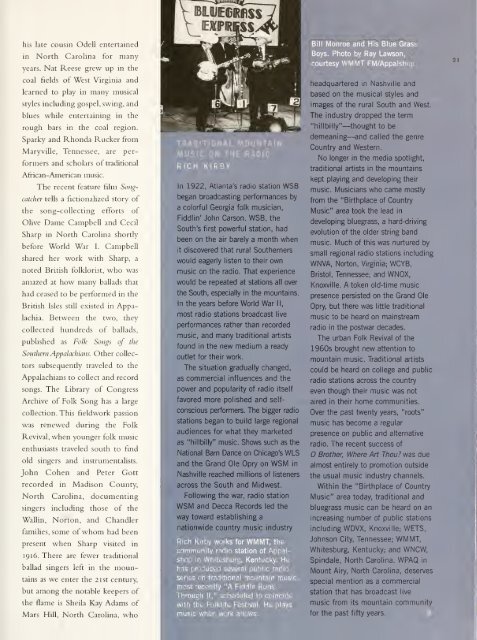SCOTLAND - Smithsonian Digital Repository - Smithsonian Institution
SCOTLAND - Smithsonian Digital Repository - Smithsonian Institution
SCOTLAND - Smithsonian Digital Repository - Smithsonian Institution
Create successful ePaper yourself
Turn your PDF publications into a flip-book with our unique Google optimized e-Paper software.
V IBLIUECRfl$$7|<br />
his late cousin Odell entertained<br />
in North Carolina for many<br />
years. Nat Reese grew up in the<br />
coal fields of West Virginia and<br />
learned to play in many musical<br />
styles including gospel, swing, and<br />
blues while entertaining in the<br />
rough bars in the coal region.<br />
Sparky and Rhonda Rucker from<br />
MaryviUe, Tennessee, are performers<br />
and scholars of traditional<br />
African-American music.<br />
The recent feature film Songcatcher<br />
tells a fictionalized story of<br />
the song-collecting efforts of<br />
Ohve Dame Campbell and Cecil<br />
Sharp in North Carolina shortly<br />
before World War I. Campbell<br />
shared her work with Sharp, a<br />
noted British folklorist, who was<br />
amazed at how many baUads that<br />
had ceased to be performed in the<br />
British Isles still existed in Appalachia.<br />
Between the two, they<br />
collected hundreds of ballads,<br />
published as Folk Songs of the<br />
Southern Appalachians. Other collectors<br />
subsequently traveled to the<br />
Appalachians to collect and record<br />
songs. The Library of Congress<br />
Archive of Folk Song has a<br />
large<br />
collection. This fieldwork passion<br />
was renewed during the Folk<br />
Revival, when younger folk music<br />
enthusiasts traveled south to find<br />
old singers and instrumentahsts.<br />
John Cohen and Peter Gott<br />
recorded in Madison County,<br />
North Carolina, documenting<br />
singers including those of the<br />
Wallin, Norton, and Chandler<br />
families, some of whom had been<br />
present when Sharp visited in<br />
1916. There are fewer traditional<br />
ballad singers left in the mountains<br />
as we enter the 21st century,<br />
but among the notable keepers of<br />
the flame is Sheila Kay Adams of<br />
Mars Hill,<br />
North Carolina, who<br />
TRADITIONAL MOUNTAIN<br />
MUSIC ON THE RADIO<br />
In<br />
1922, Atlanta's radio station WSB<br />
began broadcasting performances by<br />
a colorful Georgia folk musician,<br />
Fiddlin' John Carson. WSB, the<br />
South 's first powerful station, had<br />
been on the air barely a month when<br />
it discovered that rural Southerners<br />
would eagerly listen to their own<br />
music on the radio. That experience<br />
would be repeated at stations all over<br />
the South, especially in the mountains.<br />
In the years before World War II,<br />
most radio stations broadcast live<br />
performances rather than recorded<br />
music, and many traditional artists<br />
found in the new medium a ready<br />
outlet for their work.<br />
The situation gradually changed,<br />
as commercial influences and the<br />
power and popularity of radio itself<br />
favored more polished and selfconscious<br />
performers. The bigger radio<br />
stations began to build large regional<br />
audiences for what they marketed<br />
as "hillbilly" music. Shows such as the<br />
National Barn Dance on Chicago's WIS<br />
and the Grand Ole Opry on WSM in<br />
Nashville reached millions of listeners<br />
across the South and Midwest.<br />
Following the war, radio station<br />
WSM and Decca Records led the<br />
way toward establishing a<br />
nationwide country music industry<br />
community radio station of Appalshop<br />
in Whitesburg, Kentucky. He<br />
has produced several public radio<br />
series on traditional mountain music,<br />
most recently "A Fiddle Runs<br />
Through It," scheduled to coincide ;<br />
with the Folklife Festival.<br />
music when work allows.<br />
He pl^<br />
lonroe and His Blue Grass<br />
Photo by Ray Lawson,<br />
sy WMMT FM/Appalshop<br />
headquartered in<br />
Nashville and<br />
based on the musical styles and<br />
images of the rural<br />
South and West.<br />
The industry dropped the term<br />
"hillbilly"—thought to be<br />
demeaning—and called the genre<br />
Country and Western.<br />
No longer in the media spotlight,<br />
traditional artists in the mountains<br />
kept playing and developing their<br />
music. Musicians who came mostly<br />
from the "Birthplace of Country<br />
Music" area took the lead in<br />
developing bluegrass, a hard-driving<br />
evolution of the older string band<br />
music. Much of this was nurtured by<br />
small regional radio stations including<br />
WNVA, Norton, Virginia; WCYB,<br />
Bristol, Tennessee; and WNOX,<br />
Knoxville. A token old-time music<br />
presence persisted on the Grand Ole<br />
Opry, but there was little traditional<br />
music to be heard on mainstream<br />
radio in the postwar decades.<br />
The urban Folk Revival of the<br />
1960s brought new attention to<br />
mountain music. Traditional artists<br />
could be heard on college and public<br />
radio stations across the country<br />
even though their music was not<br />
aired in their home communities.<br />
Over the past twenty years,<br />
music has become a regular<br />
"roots"<br />
presence on public and alternative<br />
radio. The recent success of<br />
Brother,<br />
Where Art Thou? was due<br />
almost entirely to promotion outside<br />
the usual music industry channels.<br />
Within the "Birthplace of Country<br />
Music" area today, traditional and<br />
bluegrass music can be heard on an<br />
increasing number of public stations<br />
including WDVX, Knoxville; WETS,<br />
Johnson City, Tennessee; WMMT,<br />
Whitesburg, Kentucky; and WNCW,<br />
Spindale, North Carolina. WPAQ in<br />
Mount Airy,<br />
North Carolina, deserves<br />
special mention as a commercial<br />
station that has broadcast live<br />
music from its mountain community<br />
for the past fifty years.
















